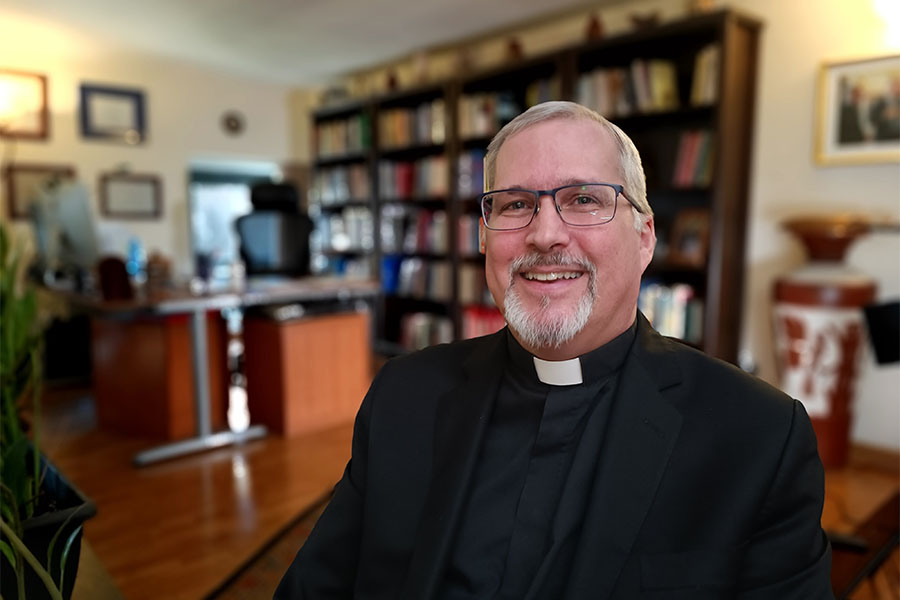VATICAN CITY (CNS) — Keyun Ruan, chief information security officer at Alphabet, Google’s parent company, posed the question, “Why do we need AGI?” in reference to artificial general intelligence — AI systems that can match or exceed human intelligence across a wide range of situations.
Speaking at a conference on human flourishing and technology in the headquarters of the Pontifical Academy of Sciences May 23, Ruan said that determining AGI’s purpose and service to humanity is “a broader conversation that we have never really had at a global level.”
Scholars, tech experts, and business leaders gathered at the Vatican for a two-day conference to have that conversation about integrating emerging technologies and advancing the good of humanity.

OpenAI, the creator of ChatGPT, defines AGI as “highly autonomous systems that outperform humans at most economically valuable work,” and developing it has become a central goal of the company as well as for Meta, Facebook’s parent company, Google and others.
“It’s almost like some people think that this is the right objective because we need it in the short term, so we should pursue it,” Ruan said. “But whether we should (make) something that is more intelligent than us when society is not ready is another kind of question.”
The development of AGI requires huge monetary investments, “and there is not an equal size of investments and funding in alignment, in ethics, in human flourishing,” she noted. “We want to get the equation balanced before we race into AGI.”
As the development of artificially intelligent technology marches forward, “the framework to evaluate whether or not AI is being used correctly is that of human flourishing,” said Father Philip Larrey, a professor of philosophy at Boston College and chairman of Humanity 2.0, a nonprofit working to integrate technology and human flourishing.
Father Larrey cited a Goldman Sachs report which estimates that in the long-term artificial intelligence could replace the equivalent of 300 million full-time jobs. Just because humanity can produce these tools at a rapid pace doesn’t mean they should without finding an adequate solution for humanity to adapt to them, he said, yet “the tendency is to grant AI more and more autonomy because they are good at the jobs we want them to complete.”
Dennis Snower, an economist and president of the Global Solutions Initiative, told Catholic News Service that today “artificial intelligence is driven largely by business interests with a focus on profits and shareholder value, and these don’t align properly with our needs to flourish both individually and socially.”
Tech developers as well as business and government leaders need to “realign our profit motive with our social and environmental needs,” he said, and faith “is a vital instrument that will enable us to achieve this wider perspective.”
“Now that we’re generating all these global problems, we need, among other things, to see ourselves as part of a common humanity when addressing these problems, and the great faiths are an important steppingstone in that direction,” Snower said.
Ketan Patel, CEO of Greater Pacific Capital and chair of the Force for Good Initiative, told CNS that there is currently a shift in investment toward human flourishing and that faith leaders must be involved in guiding that movement since they “have a perspective beyond the motives of commerce.”
James Pawelski, director of education in the University of Pennsylvania’s Positive Psychology Center, told the conference that advancing human flourishing requires “connecting culture with physical and mental health,” as well as identifying culture’s role in fostering social connection and cultivating spirituality.
Elisabeth Kincaid, director of the Center for Ethics and Economic Justice at Loyola University New Orleans, said that “art, culture (and) relationships can take us beyond ourselves,” but that “artificial intelligence can never capture something beyond us.”
The Catholic tradition is filled with hope, she said, but is also tinged with a sense of “bitterness,” or a feeling that human life does not conform to what it is meant to be, which is why “human flourishing in relationship to AI, which can promise us a utopia, needs to always be aware of both the beauty and the pain that we all experience.”
Whether AI systems can be imbued with the wealth of human experience remains to be seen, the experts said, but a larger question is whether the technology will keep humanity’s best interest at heart when its intelligence surpasses that of the people who created it.
“The potential for good, the potential for addressing humanity’s greatest issues is unparalleled, unprecedented and profound,” said Janet Adams, chief operating officer at SingularityNET, a decentralized marketplace for AI algorithms. “The question is, who’s going to develop that AGI and with what values?”
Read More Vatican News
Copyright © 2024 Catholic News Service/U.S. Conference of Catholic Bishops










